Key takeaways:
- Takeaway options can be both indulgent and healthy, emphasizing the importance of choosing meals with whole ingredients over processed ones.
- Transitioning to whole foods enhances energy levels, digestion, and mental clarity, highlighting their impact on overall well-being.
- Challenges in adopting whole foods include overcoming cravings, learning to cook with new ingredients, and navigating social dining situations.
- Mindfulness in food choices fosters a deeper connection to meals and opens conversations about healthier eating.
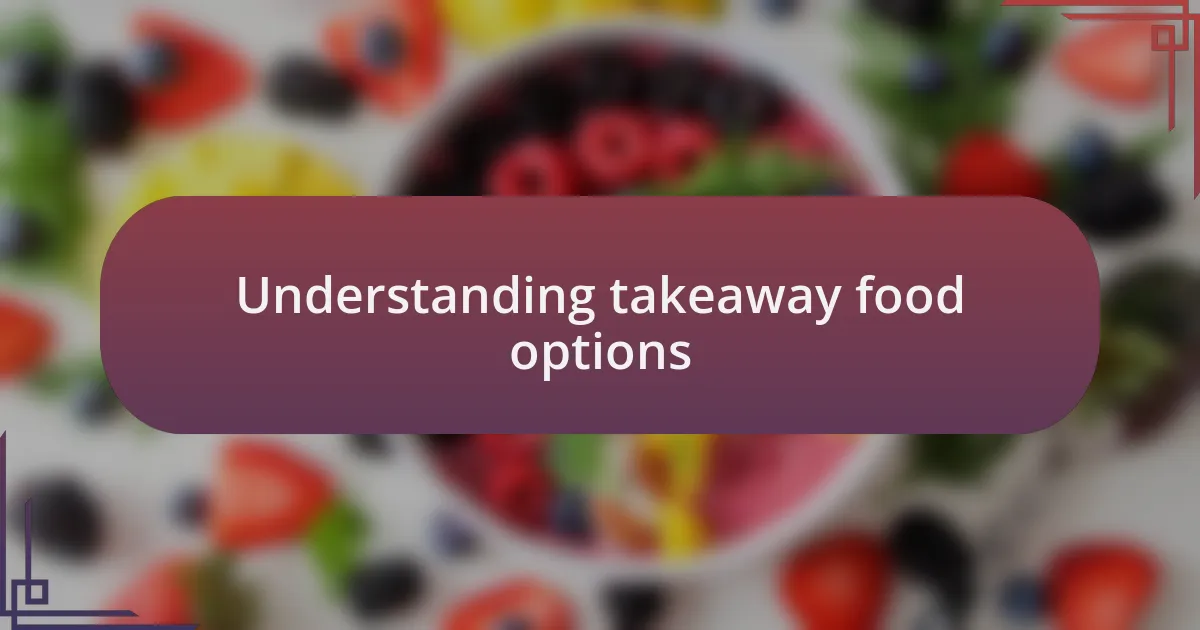
Understanding takeaway food options
When I think about takeaway food, I often recall the thrill of discovering local gems that offer unique cuisines. Each option tells a story, from the comforting aroma of a freshly made pizza to the vibrant flavors of a Thai curry. Have you ever found yourself captivated by a dish you once had on a spontaneous night out?
Navigating takeaway menus can sometimes feel overwhelming, especially with so many choices available. I remember the last time I ordered, I was torn between a greasy burger and a colorful salad. I chose the salad and felt surprisingly satisfied; it made me realize how takeaway can be a healthy indulgence too. What options have surprised you in a good way?
Understanding the nutritional differences between takeaway meals is essential; it can transform your dining experience. I’ve learned to scrutinize menus a bit more, looking for whole ingredients rather than processed ones. This awareness not only enriches my meals but often sparks a conversation about healthier eating with friends, making takeaway a topic of excitement rather than guilt.
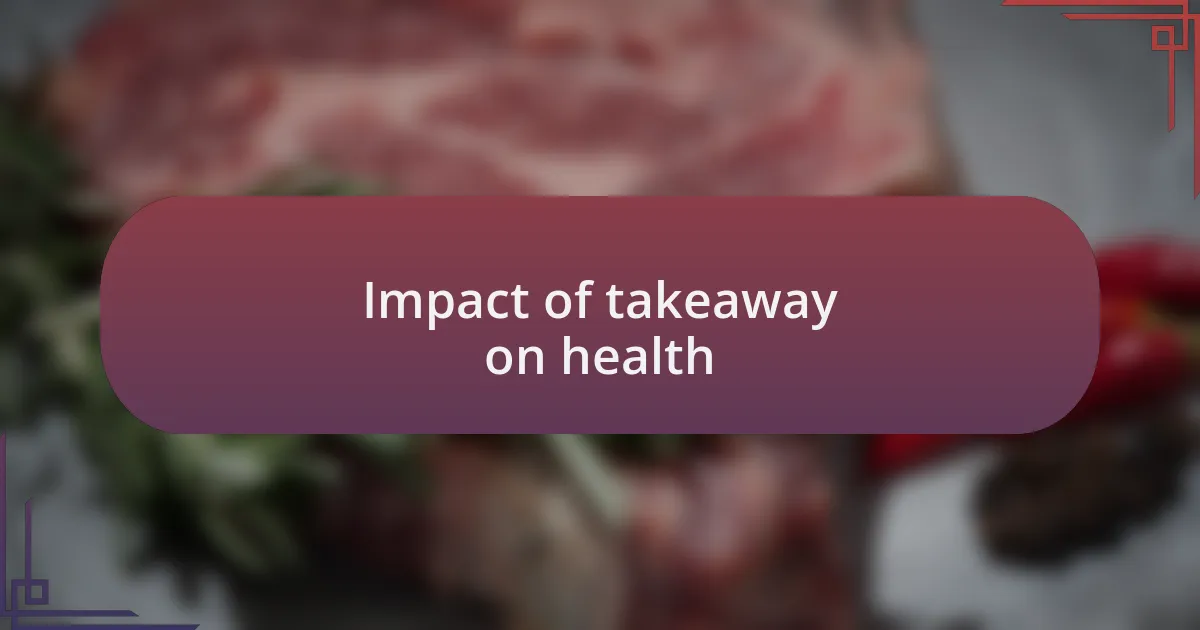
Impact of takeaway on health
Takeaway food can deeply impact our health, often in ways we don’t immediately recognize. During my own journey, I noticed how frequent indulgence in takeout led to unwanted weight gain and sluggishness. Have you felt that post-takeout crash that leaves you reaching for a nap instead of enjoying your evening?
I’ve started paying attention to the ingredients in my takeaway choices, and the results have been eye-opening. I remember ordering a supposedly healthy quinoa bowl that turned out to be loaded with hidden sugars and unhealthy dressings. This taught me to ask questions about what I’m consuming, fostering a more mindful approach to takeaway meals.
The convenience of takeaway can sometimes overshadow its nutritional downsides. Reflecting on my experiences, I’ve realized that while takeout can fit into a healthy lifestyle, it requires a bit more effort to choose wisely. What have you learned by looking beyond the menu, and how has it changed your takeaway habits?
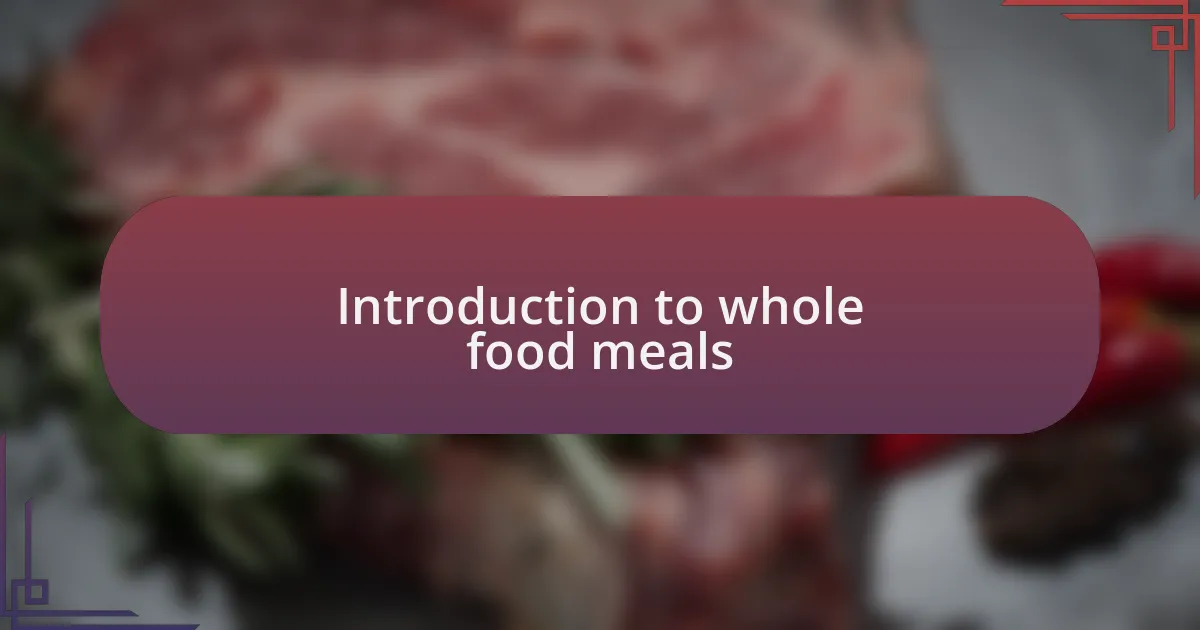
Introduction to whole food meals
Transitioning to whole food meals has fundamentally changed my relationship with food. Whole foods are unprocessed and free from artificial ingredients, which means they are closer to nature and often packed with nutritional value. Have you ever taken a moment to savor a fresh apple versus a store-bought snack? The difference is palpable.
I recall my first week of focusing on whole foods was both exciting and challenging. I found joy in exploring local farmer’s markets, where I discovered vibrant produce that sparked my creativity in the kitchen. I vividly remember the satisfaction of cooking a simple stir-fry with fresh vegetables, feeling the textures and colors come alive. This experience reinforced my belief that the act of cooking with whole foods fosters a meaningful connection to what we eat.
As I delved deeper into whole food meals, I realized they often require a shift in mindset. It’s not merely about eliminating processed options; it’s about embracing a broader spectrum of flavors and ingredients. Have you considered how whole foods can simplify meal prep by relying on fewer components? This approach not only leads to healthier choices but also makes the process of cooking feel more rewarding and less daunting.
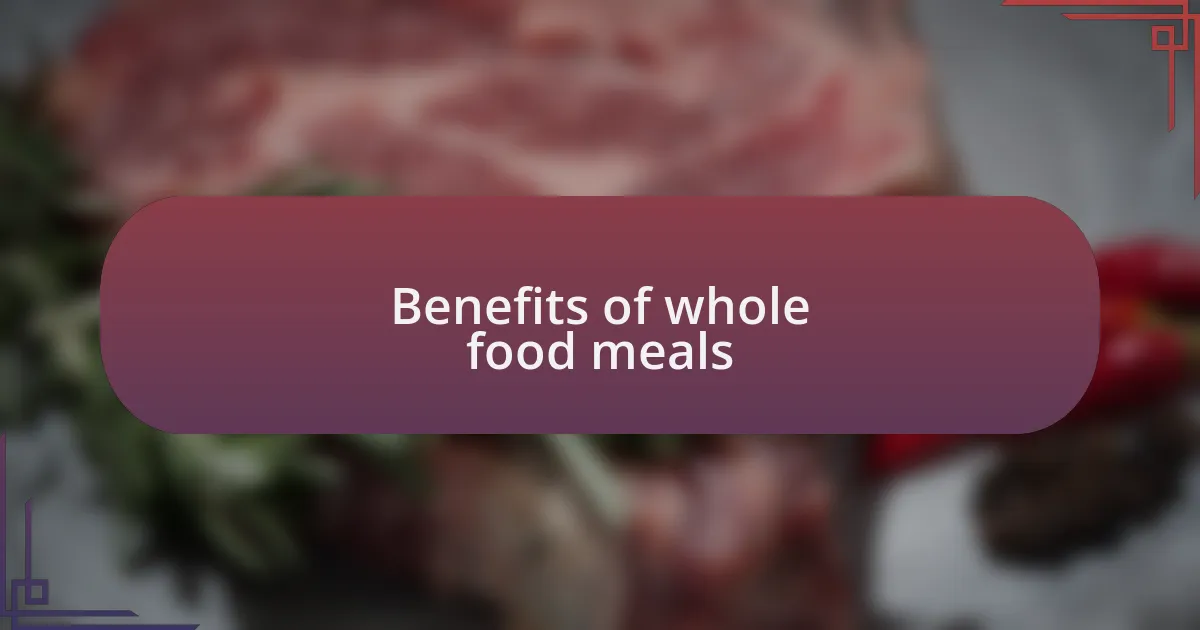
Benefits of whole food meals
Adopting whole food meals has significantly improved my overall well-being. I’ve noticed that since I made this transition, my energy levels have soared. For instance, I used to experience that mid-afternoon slump, but now, after a lunch of quinoa and roasted vegetables, I feel revitalized and ready to tackle the rest of my day. Isn’t it incredible how what we eat can influence our daily energy?
Another benefit I’ve experienced is the remarkable improvement in my digestion. Incorporating whole foods has meant more fiber in my diet, which not only keeps me feeling full longer but also promotes a healthy gut. I remember the first time I tried a hearty lentil soup loaded with fresh herbs and vegetables—being mindful of each bite truly enhanced my meal experience. Have you ever noticed how satisfying a simple, wholesome dish can be?
Finally, one of the most rewarding aspects of eating whole foods is the positive impact on my mental clarity. I’ve found myself thinking more clearly and feeling less foggy after meals. When I enjoy a colorful salad topped with nuts and seeds, it feels as though my mind is sharper and ready to create. Does food truly have the power to elevate our mood and mental state? In my experience, it certainly does, making whole food meals not just about nutrition but about enhancing quality of life.
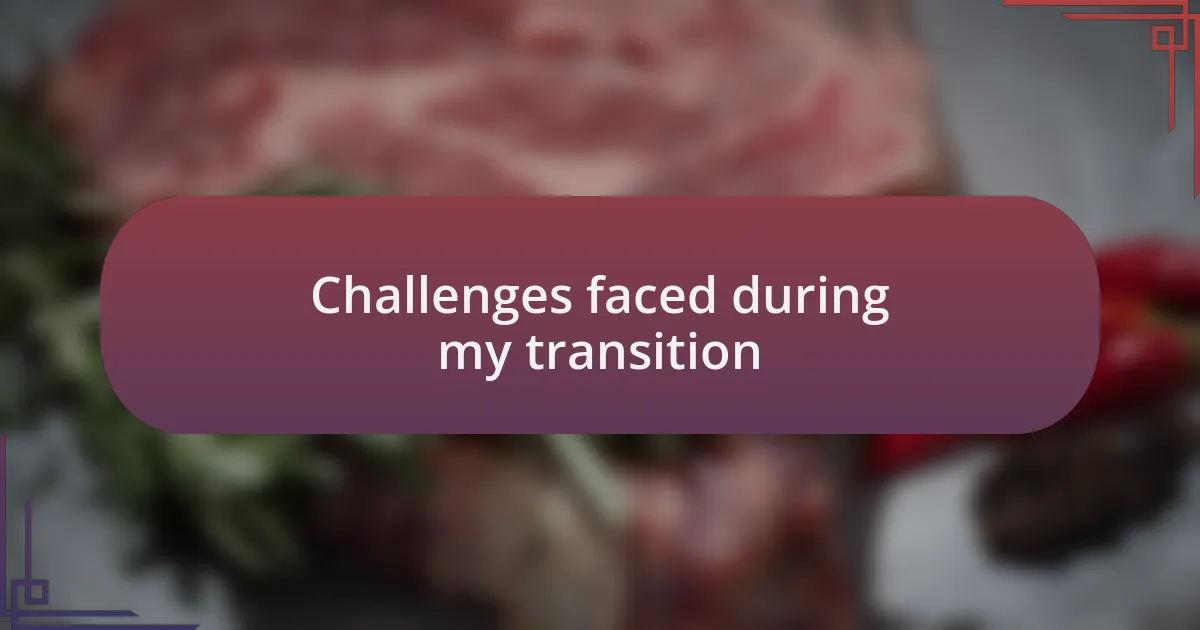
Challenges faced during my transition
Transitioning to whole foods wasn’t a walk in the park. I remember the first week vividly—I faced immense cravings for my usual takeout meals. My mind was constantly drifting to those familiar flavors, and it felt like a battle that I had to fight daily. Have you ever felt torn between the comfort of old habits and the excitement of new beginnings? It was tough, but I gradually learned to replace those cravings with whole food alternatives.
Another significant challenge emerged when I was learning to cook with unfamiliar ingredients. It was disheartening at times when my first attempts at making homemade dishes like brown rice and stir-fried vegetables turned out less than perfect. I felt frustrated standing over the stove, wondering if I’d made the right choice. This led me to question: Can I really enjoy cooking if I keep failing? However, persistence paid off, and each stumble in the kitchen helped me grow more comfortable and confident with whole-food meal prep.
Lastly, there was the social aspect of my transition that threw me for a loop. Dining out with friends became a test of my resolve. I often felt like the odd one out, scanning the menu for something that wouldn’t derail my commitment. Have you experienced the pressure of social situations while attempting to change your eating habits? Ultimately, I learned to communicate my choices openly and found joy in sharing the dishes I was passionate about, turning meals together into a celebration of food rather than a struggle.